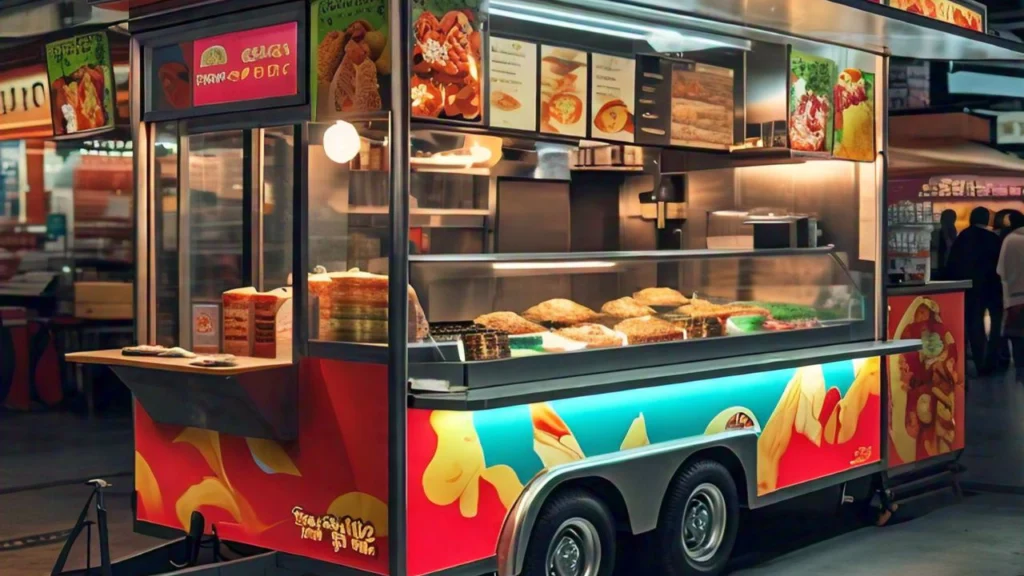Marketing Strategy Ideas for Local Businesses

In a rapidly evolving marketplace, local businesses must leverage effective marketing strategies to stand out and attract customers. With a thoughtful approach, even small businesses can achieve significant results. This comprehensive guide delves into actionable marketing strategies specifically tailored for local businesses, ensuring you connect with your community and foster growth.
Key Highlights:
- Deep market understanding and local SEO optimization are crucial for local business success.
- Leveraging social media, mobile carts, and community involvement can significantly boost brand visibility and customer engagement.
- Consistently monitoring performance and adjusting strategies are essential for effective marketing and sustained growth.
Understand Your Local Market
A deep understanding of your local market is crucial for tailoring your marketing efforts.
Market Research
- Customer Demographics: Analyze your local area’s demographics such as age, income, and lifestyle. Tools like the U.S. Census Bureau’s data or local government reports can provide valuable insights.
- Behavioral Insights: Use online surveys and social media polls to gather information on customer preferences and pain points.
- Local Trends: Stay updated on local trends by following community news, attending local events, and engaging with local business networks.
Competitor Analysis
- SWOT Analysis: Conduct a SWOT analysis (Strengths, Weaknesses, Opportunities, Threats) of your competitors to identify what sets you apart.
- Benchmarking: Compare your offerings, pricing, and marketing tactics with competitors to find areas for improvement and differentiation.
Optimize Your Online Presence
An optimized online presence is essential for capturing local traffic and engaging with your audience.
Local SEO
- Google My Business (GMB) Optimization: Regularly update your GMB profile with high-quality images, accurate business hours, and compelling descriptions. Utilize GMB Posts to share updates and promotions.
- Local Listings: Ensure consistency across all local directories like Yelp, Bing Places, and TripAdvisor. Inconsistent information can hurt your local SEO.
- Schema Markup: Implement local business schema markup on your website to help search engines understand your business details.
Mobile Optimization
- User Experience (UX) Design: Design your website with a mobile-first approach. Ensure that buttons are easy to tap, and content is easily readable on smaller screens.
- Mobile Page Speed: Use tools like Google PageSpeed Insights to test and improve your mobile page load speed.
Leverage Social Media

Social media is a powerful tool for local engagement and brand building.
Content Strategy
- Local Content Creation: Share content that highlights local culture, events, and landmarks. For instance, post about community events you’re participating in or local partnerships.
- Interactive Content: Use polls, Q&A sessions, and live videos to engage with your audience in real-time. Interactive content fosters deeper connections with your audience.
Social Media Advertising
- Geo-Targeted Ads: Utilize geo-targeting features on platforms like Facebook and Instagram to reach users within specific locations.
- A/B Testing: Experiment with different ad creatives, headlines, and audiences to determine what resonates best with your local demographic.
Utilize Mobile Carts

Mobile carts, such as food and coffee carts, offer a dynamic way to enhance brand visibility. Companies like Gathering Events specializes in creating bespoke mobile carts tailored to your branding needs and provide catering services for events, making them perfect for local and corporate functions. Their carts feature eye-catching designs and interactive elements, allowing you to effectively promote your business and engage your target audience through seasonal and themed customizations.
Brand Visibility and Promotion
- Custom Branding: Design your mobile cart or food cart with your business’s branding to transform it into a moving advertisement. This helps increase visibility at local events and corporate functions.
- Social Media Engagement: Use your cart as a backdrop for engaging social media content. Share photos and encourage customers to tag your business, turning your cart into a social media asset.
Collaborative Opportunities
- Event Partnerships: Partner with local events to set up your branded cart. For example, offer samples or promotions at festivals and community gatherings to attract attention and drive traffic.
- Corporate Collaborations: Provide mobile cart services for corporate events to boost visibility among professionals. Tailor your cart for functions like seminars and product launches to ensure your brand stands out.
Interactive Customer Experiences
- Customer Engagement: Create interactive experiences by offering exclusive discounts or samples at your cart. Engage directly with customers to build connections and enhance brand loyalty.
- Seasonal and Themed Events: Adapt your cart for seasonal or themed promotions, such as a hot chocolate cart for winter events. Customizing your cart for various occasions keeps your marketing efforts fresh and relevant.
Engage in Community Involvement
Active community involvement enhances your business’s reputation and builds trust.
Sponsorships and Partnerships
- Local Charities and Events: Sponsor charity events or local sports teams. This not only boosts your visibility but also demonstrates your commitment to the community.
- Cross-Promotions: Partner with complementary local businesses for co-branded events or promotions. For example, a bakery could partner with a coffee shop for a joint discount offer.
Host Your Own Events
- Community Workshops: Organize workshops or classes related to your industry. For instance, a gardening store could host a planting workshop.
- Seasonal Events: Plan events around local holidays or seasons to attract foot traffic and create buzz.
Utilize Traditional Marketing

Traditional marketing methods still play a significant role in local promotion.
Local Advertising
- Targeted Print Advertising: Advertise in local magazines, community newsletters, or newspapers that have a strong readership in your area.
- Radio and TV Ads: Consider local radio or TV ads to reach a broader audience. Craft ads that highlight your unique selling propositions and local presence.
Direct Mail
- Personalized Direct Mail: Use customer data to send personalized offers and promotions. Personalized mailers are more likely to be read and acted upon.
- Postcard Campaigns: Design visually appealing postcards with special discounts or event invitations to grab attention.
Implement Referral Programs
Referral programs can drive new customers through trusted recommendations.
Referral Incentives
- Discounts and Rewards: Offer discounts or gift cards for every successful referral. Ensure that the reward is appealing enough to motivate your customers.
- Referral Tracking: Use referral tracking software or tools to manage and track referrals effectively. This ensures accurate reward distribution and program management.
Referral Contests
- Engagement: Run contests where customers can win prizes for referring the most new clients. Promote these contests through your website and social media channels.
Focus on Customer Experience
A great customer experience is the cornerstone of customer retention and brand loyalty.
Personalized Service
- CRM Systems: Implement Customer Relationship Management (CRM) systems to keep track of customer interactions and preferences.
- Personal Touch: Remember customer names and preferences to create a personalized experience. Simple gestures like remembering a customer’s favorite order can make a big difference.
Exceptional Customer Service
- Training Programs: Regularly train your staff on customer service best practices and ensure they are equipped to handle various customer situations.
- Feedback Mechanisms: Actively seek feedback through surveys, comment cards, or online reviews. Use this feedback to make improvements and address any issues promptly.
Monitor and Adjust Your Strategy
Regular monitoring and adjustment are vital for optimizing your marketing efforts.
Analytics and Metrics
- Performance Metrics: Track key performance indicators (KPIs) such as website traffic, conversion rates, and social media engagement. Use Google Analytics and social media insights to gather data.
- ROI Analysis: Measure the return on investment (ROI) of your marketing campaigns to determine which strategies are delivering the best results.
Strategy Adjustments
- Agility: Be prepared to adjust your strategies based on performance data and market changes. If a particular tactic isn’t working, be flexible and try alternative approaches.
Develop a Loyalty Program
A well-structured loyalty program encourages repeat business and strengthens customer relationships.
Program Design
- Points-Based Rewards: Implement a points-based system where customers earn rewards for each purchase. For example, a coffee shop could offer a free drink after ten purchases.
- Exclusive Perks: Provide exclusive offers, early access to sales, or special events for loyalty program members.
Promotion and Engagement
- Marketing the Program: Promote your loyalty program through your website, social media, and in-store signage.
- Regular Updates: Keep your loyalty program fresh with new rewards and offers to maintain customer interest and engagement.
Embrace Local Influencers

Local influencers can help amplify your brand’s message and reach a broader audience.
Identifying Influencers
- Local Bloggers and Social Media Influencers: Partner with local bloggers or social media influencers who have a strong following in your community.
- Micro-Influencers: Consider working with micro-influencers who have a smaller but highly engaged audience.
Collaboration Opportunities
- Sponsored Posts: Collaborate with influencers for sponsored posts or reviews. Ensure that their content aligns with your brand values.
- Event Collaborations: Invite influencers to your events or offer them exclusive access to promote your business.
Conclusion
Local businesses have a unique opportunity to build strong, lasting relationships with their community through well-crafted marketing strategies. By understanding your local market, optimizing your online presence, engaging with your community, and continually refining your approach, you can drive significant growth and success. Implement these ideas to leverage the full potential of your local business and create a lasting impact in your area.

